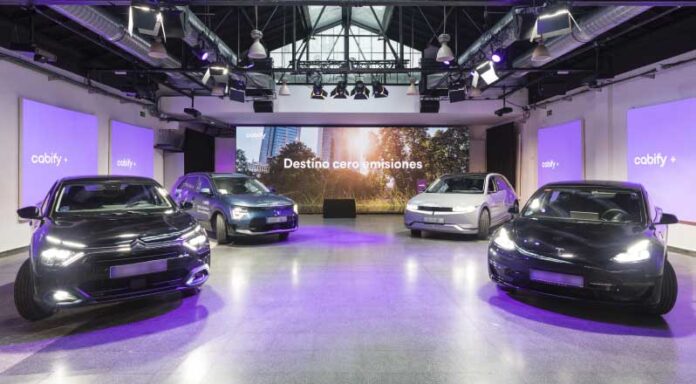- The Spanish platform advances in the electrification project of its fleet, which has the support of the European Investment Bank and the European Commission
- 196 new 100% electric vehicles will be fully operating on the platform in the coming weeks.
- The car models that will join Cabify’s fleet are Tesla Model 3 Long Range RWD, Kia eNIRO Concept, Citroën ë-C4x Shine and Hyundai Ioniq 5.
- These vehicles, 100% electric, zero emissions, and with a range in urban use exceeding 400 kilometers, will save more than one million liters of fuel and avoid the emission of 1,700 tons of CO2.
Madrid, November 14, 2023. The Spanish multi-mobility platform Cabify announced today that 196 new 100% electric cars will be incorporated into the fleet of Vecttor, a subsidiary of the Cabify group, and will be available through Cabify’s platform before the end of the year. This operation is part of Cabify’s fleet electrification project, which the European Investment Bank and the European Commission support.
All these new vehicles, 100% electric, will be operating in Madrid, in the Vecttor fleet, available for private users and companies that decide to use Cabify to move around the city in a sustainable way. Among the categories where these vehicles will be available is ‘Cabify Eco’, the exclusive category for companies, that has only electrified vehicles (hybrids, plug-in hybrids, and 100% electric), but they can also be found in the categories ‘Cabify’, ‘Kids’ or ‘Plus’, among others.
Tesla Model 3 Long Range RWD, Kia eNIRO, Citroën ë-C4x Shine, and Hyundai Ioniq 5 are the selected models.
The models chosen were Tesla Model 3 Long Range RWD, Kia eNIRO Concept, Citroën ë-C4x Shine, and Hyundai Ioniq 5 of 168 kW. All of them are zero-emissions, 100% electric vehicles, with a range in urban use of more than 400 kilometers and technical characteristics and sizes suitable for passenger transport. Thanks to the incorporation of these cars, the emission of 1,700 tons of CO2 per year and the consumption of more than one million liters of fuel will be avoided.
“With the support of the European Investment Bank and the European Commission, we are taking the necessary steps to lead the decarbonization of the urban mobility sector. Reaching zero emissions by 2025 is an ambitious goal, but we have the right strategy to achieve it. These advances also allow us to help other freelancers and companies in the sector to take a step towards electrification thanks to our own experience and agreements with manufacturers,” explains Juan de Antonio, CEO and Founder of Cabify.
“From Vecttor, we continue to lead the way in electrification in Spain, and this milestone is further proof of this. After incorporating these cars, all Vecttor vehicles in Spain will have ECO and Zero labels, being 24% of cars with Zero labels and the remaining 76% ECO. In contrast, nationally, less than 4% of the national fleet has one of these labels. Our commitment to technology and sustainability is our best letter of introduction”, says Miguel Ángel Toledo, CEO of Vecttor.
The aim of this project is for Cabify to achieve the objectives set out in its Sustainable Business Strategy in terms of decarbonization. In this regard, the company has set a goal that 100% of trips will be made in electric vehicles or other zero-emission technologies by 2025 in Spain and by 2030 in Latin America.
Cabify reduces its emissions in Spain despite making more trips
Until this goal is reached, the company remains committed to reducing and offsetting emissions. Since 2018, all trips made on the Cabify platform are carbon neutral, as emissions are offset in local projects in the seven countries where the company operates (Argentina, Chile, Colombia, Spain, Mexico, Peru, and Uruguay).
In the last year, the company has reduced in Spain the total emissions of trips through the platform, despite the fact that the volume of trips has increased in this period, a milestone that Cabify has reached for the first time in its history. This is caused by an 11% reduction in average CO2 emissions/km, thanks to multiple technological developments and also to the incorporation of more sustainable or zero-emission vehicles, such as hydrogen or electric cars.
About Cabify
Cabify is a multi-mobility platform for people and objects that offers various alternatives to reduce urban travel in private cars, taking advantage of technology to make cities better places to live.
And, all of this, while being an economically, environmentally, and socially sustainable company. Cabify, a member of the UN Global Compact, stands out for its commitment to talent and the local ecosystem, contributing to generating high-value jobs and declaring 100% of its activity in each country. In 2018 it became the first carbon-neutral platform in its sector and since then it has been globally offsetting its emissions and those of its passengers, and meets an annual reduction commitment.
Cabify has been transforming the way people move around the city for 10 years, with more than 50 million registered users and 1.5 million collaborating partner drivers and taxi drivers. After being born in Madrid, the company spread, within a few months, to Latin America and is currently present in Argentina, Chile, Colombia, Spain, Mexico, Peru, and Uruguay.
Press contact Cabify
Alvaro Perez. alvaro.perez@cabify.com
Irene Recio. irene.recio@cabify.com




